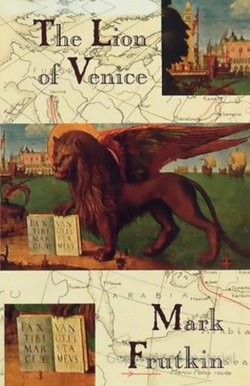Читать книгу The Lion of Venice - Mark Frutkin - Страница 4
На сайте Литреса книга снята с продажи.
Prologue
ОглавлениеIn the year 1298, soon after my return from the East, the Genoese threw me in prison. I shared a filthy cell with a Pisan who called himself Rusticello. He had a bad smell and a wheedling, bothersome voice.
Marco awakens on his bed of straw, the stained wall before his eyes assembling itself out of the shards of his dreams.
He sees cracks on the wall splay out like sprigs of lightning on a map, twining across a thousand leagues, ten thousand parasang, a hundred thousand li. With his finger he absently traces his journey, winding and unpredictable as birdsong.
He supposes he is lucky to be alive.
When Marco had first returned from the East, the Doge of Venice appointed him Gentleman-Commander of a galley with a hundred oar, part of a Venetian fleet that engaged the Genoese in the Greek sea. To the boom of kettle drums and cry of horns, the Venetians sailed straight into battle and prompt defeat. Marco and seven thousand others were captured, their ships towed backwards to the port of Genoa, the banners bearing their proud lions, dragging in the waves.
He had watched with the other Venetian sailors, stunned, as they landed at Genoa under a low grey sky and the despairing commander of the Venetian fleet leapt onto the quay and beat his brains out against a stone bench.
Then Marco was thrown into a prison cell. That was three days ago.
Marco rolls over. Rusticello, sitting across the room, stares at him.
“Dream?”
Rusticello, a scribe and poet from Pisa, arrested for an unknown crime, shares the cell. A specialist in chivalry and its lore, the Pisan had garnered a smattering of fame for his Provencal romances.
Marco gazes at Rusticello without speaking. Who is this Pisan? Fifty unenviable years on his shoulders, his lank dirty hair an unseemly length, fat as a friar with thick soft hands to match, nails yellow, half his teeth broken or missing, long ears with fleshy lobes, tufts of hair growing from his nostrils. An obsessive mind, too, with penetrating eyes, round and small as peas. And a sour smell, as of grain fermenting. I suppose I will smell as bad soon enough.
Already it seems to Marco he has spent a lifetime staring at the four walls, trapped with the disputatious Pisan whose insistent, grating voice has worked at him as a knife scrapes at a mussel clinging to seaside rocks.
A salt mist drifts through the square window. Marco sniffs the air– the open sea. He fills his lungs with it.
Rusticello speaks, as if the night were but a momentary pause in their conversation of the previous evening. “So you see, Marco, I myself have penned several romance tales and I can tell you this–a work already exists. It exists in eternity; we can only hope to reveal it as it coils down out of the light and into time, where all men can see it.”
From his pile of straw, Marco scoffs. “All men? Even the great Khan from his gold-lined tomb? Pah! If I have learned anything, I have learned this: the uselessness of letters.”
“I take note of your cynicism, but one must be willing to make the attempt. Lord God of Angels, let me write the book, Marco. A description of the world. Tell me. Look here– I have paper, quill, ink. I am ready. I listen.”
Marco gazes into the brightness, stares into the empty glyph of the window. “I never went anywhere. My journey was simply a tale that appeared before my eyes as I rode into it. And as I pushed on I passed deeper and deeper into other tales and the tales within those and tales within those. I tell you, I never went anywhere.” He rubs his hand across his eyes. “So many…words. Descriptions of the world. Tell me, Rusticello, about Pisa. How is it there?”
“Much like anywhere else. Genoa. Venezia. The time passes there as it passes elsewhere. Why do you ask?”
“What does the air smell like?”
“The air? The air of Pisa? Like a swamp on a hot afternoon. But, you avoid me.” He taps the quill on the blank sheet. “Let me write the book. Now. I and all the angels in heaven are listening.”
Marco, silent, gazes into the window's brilliant white light.
